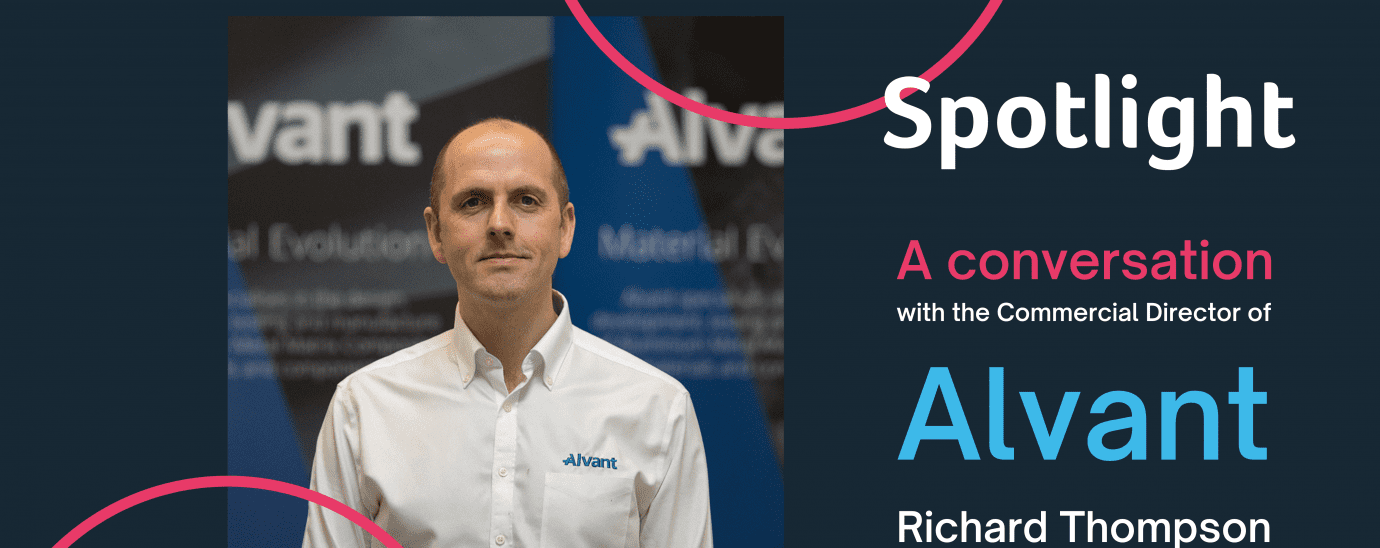Scale-up Spotlight: A conversation with the commercial director of Alvant, Richard Thompson

Richard Thompson, commercial director of materials specialist Alvant, talks about the importance of sustainability and innovation in post-Covid manufacturing and the role materials tech is playing across automotive, aerospace, consumer tech, and many other sectors.
Alvant – originally known as CMT – was established in 2003, specializing in designing, developing, testing, and manufacturing Aluminium Metal Matrix Composite materials and components (AMCs), a family of lightweight high-performance metals. AMCs are used in highly engineered products for multiple applications across many sectors, including aerospace, automotive, healthcare, the industrial, and high-end consumer. This can be parts for TVs, mobile devices, landing gear, electric motors, car interiors, biomechanical prosthetics, sports equipment, and wheelchairs – the list is as diverse as it is long!
AMCs provide the strength and stiffness of steel at less than half the weight and have superior damage tolerance and a higher thermal operating range. Engineers and manufacturers can use AMCs for more durable lightweight components for harsh environments. Product manufacturers and engineers are becoming more aware of how AMCs can sometimes be a better alternative than other composite materials or unreinforced metals.
Alvant provides ‘route to market’ services for integrating its AMCs; The focus is on solving problems with creative and commercially viable solutions. This is particularly important now as engineers face growing pressure to reduce weight to meet stringent market and legislative demands while simultaneously being cost-effective.
Richard Thompson informs that the method Alvant uses to create its materials, called Advanced Liquid Pressure Forming, has been developed specifically for its product and is patented. This sets the company apart from others in the market and makes them a viable alternative to other materials such as carbon and polymer composites, steel, titanium, and aluminum. These materials are either not recyclable or very difficult to recycle, unlike fiber-reinforced AMCs that have scope to recycle.
AMCs have many benefits, including having the strength and capability of steel yet the weight of aluminum while being more tolerant to physical and thermal damage than carbon composite materials. They also create less of an impact environmentally when it comes to sustainability issues. This is mainly because aluminum itself is abundant and has a less environmental impact during production than titanium.
It isn’t difficult to see why AMCs could provide a massive differential and offer game-changing potential across many industries as commercial demand increases for strong but lighter parts across many forms of transportation, as well as industrial and consumer applications. Companies are all looking for ways to increase product capabilities and performance while at the same time meeting ambitious goals for fuel efficiency and sustainability.
Thompson explains the company’s most significant achievement to be the part the company has contributed to the global-wide objective to achieve net-zero carbon emissions by 2050. Alvant has partnered with global-leading Safran Landing Systems on a two-year, £28 mn aerospace project titled ‘Large Landing Gear of the Future.’ Alvant’s contribution to the project is the design, manufacture, and testing of an AMC brake rod, targeting a 30% weight reduction over an equivalent titanium component while maintaining the same strength as steel. In fact, the current simulations suggest a 40% weight saving can be achieved over the original titanium part, citing a crucial project milestone scheduled for completion this year.

Besides weight reduction, the project aims to cut fuel burn and noise as part of the industry’s drive to reduce fuel consumption and carbon emissions while improving reliability and lowering ownership costs. This is of major significance for Alvant as a company because the project’s success will enable the validation of AMCs in areas where safety and reliability are essential. This puts Alvant firmly on course to help Safran not only solve some of their upcoming technological challenges but to help them remain competitive in the landing gear aerospace market and showcase innovative technologies for the industry’s future.
During Covid, the economy’s sudden plunge instantly impacted most automotive, industrial, and aerospace sectors, which unfortunately is where a significant chunk of Alvant’s market is based. Thompson says that “although we have been able to function throughout, it gave us an opportunity to bring forward part of our business growth plan and has enabled us to forge partnerships with manufacturers who still need to achieve the ambitious capability and sustainability goals, but with reduced internal resources. So, we’ve been quite lucky in many regards.”
Read More:
- Pulsar Fusion test planet-saving clean energy hybrid rocket engine
- Manufacturing in our post-Covid world
- Reduce, reuse, remanufacture: becoming a sustainable business
Moving forward, Thompson explains that the company has seen the biggest emissions decline since the Second World War during the Covid lockdown and explains that stakeholders are more concentrated now on Zero-emissions goals, so have different expectations on businesses. “Sustainability is redefining itself in the post-Covid world, and it has now changed scope, placing non-sustainable materials under far more scrutiny.” Focus has been placed largely on sustainable materials, and businesses are now considering the entire product life cycle and the ability to reuse, which is now very much a consideration in design development at Alvant.
AMCs are more sustainable thanks to the manner in which they separate the fibers from the aluminum at the end-of-life stage. Designers must increasingly factor ‘whole life cost’ into the design, and it’s an area where AMCs score well. “If we don’t use the past 12 months or so as a wake-up call and an opportunity to prompt radical change, then I don’t know what will. We may not get another chance,” Thompson states.
Click here to discover more of our podcasts
For more news from Top Business Tech, don’t forget to subscribe to our daily bulletin!
Follow us on LinkedIn and Twitter
About Richard Thompson
Commercial Director (BEng MBA CEng FIMechE)

Richard is a technology commercialization professional specializing in strategic market development, innovation, and new venture growth. Richard joined Alvant in October 2017 from Williams Advanced Engineering, the technology and engineering consultancy division of the Williams Formula 1 Group. He has worked for a range of high-performance engineering businesses and new venture companies developing and commercializing intellectual property. Richard was appointed as Commercial Director in February 2018.
